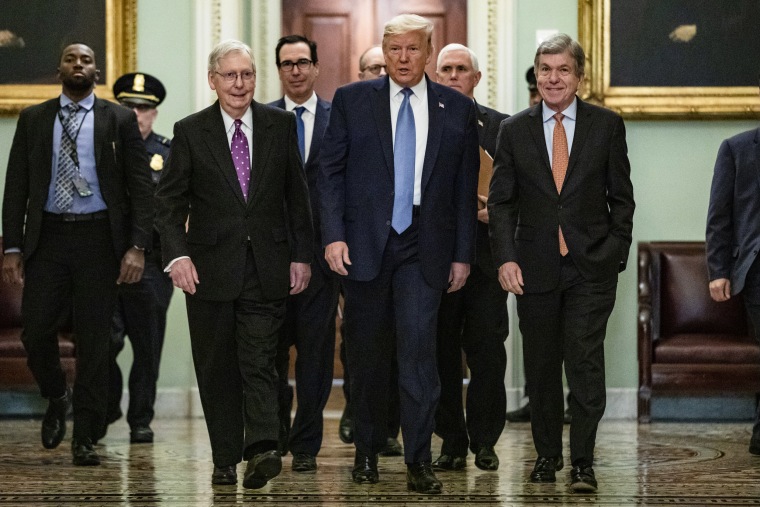Donald Trump went to Capitol Hill yesterday afternoon, apparently to pitch congressional Republicans on an economic stimulus plan that doesn't yet fully exist. After the GOP meeting, the president spoke briefly with reporters, one of whom asked how long an economic downturn Americans should expect as a result of the coronavirus outbreak.
Perhaps Trump didn't fully understand the question. After talking about the fact that the outbreak was "unexpected" and "came out of China," the Republican again tried to argue, "We're doing a great job with it." He added:
"It will go away. Just stay calm. It will go away... [B]e calm. It's really working out. And a lot of good things are going to happen. The consumer is ready, and the consumer is so powerful in our country with what we've done with tax cuts and regulation cuts and all of those things. The consumer has never been in a better position than they are right now. So a lot of good things are going to happen."
The idea that the virus will simply "go away" is a pleasant thought, but it's a passive posture that's difficult to take seriously as the infection rate grows and the death toll rises. The president's line is also badly at odds with the positions espoused by public-health authorities, none of whom is telling the public that COVID-19 will just "go away."
During the same Q&A yesterday, Trump continued to equate the coronavirus with the common flu, which remains a wildly misguided comparison given the relevant fatality rates.
Around the same time, a reporter asked if he'd been briefed on the possibility that "up to 100 million Americans would ultimately be exposed to the virus." The president responded, according to the official transcript, "Different numbers. All different numbers. Very large numbers. And some small numbers too, by the way."
Oh. Thank goodness we have a leader who can help bring clarity to such matters.
Finally, a reporter asked, "Why has the U.S. been so slow with testing? Other countries have tested tens of thousands." Trump replied:
"No, I think the U.S. has done a very good job on testing. We had to change things that were done, that were nobody's fault. Perhaps they wanted to do something a different way, but it was a much slower process from a previous administration. And we did change them. We made the changes. But the testing has gone very well. And when people need a test, they can get a test."
The reference to the "previous administration" is ridiculously untrue, and the idea that Americans can simply "get a test" for the virus is as plainly false now as it was when Trump made similar comments on Friday.
To be sure, all of this may seem quite routine. "Trump says odd, false things" is hardly a shocking headline at this point in his presidency. But the Republican's comments on the Hill yesterday struck me as especially notable because they reinforced a larger truth: as the public-health emergency intensifies, Trump isn't getting better.
He's still peddling falsehoods; he's still contradicting experts; he's still trying to shift blame; and he's still acting as if he can bluff his way out of the crisis. He cannot.
